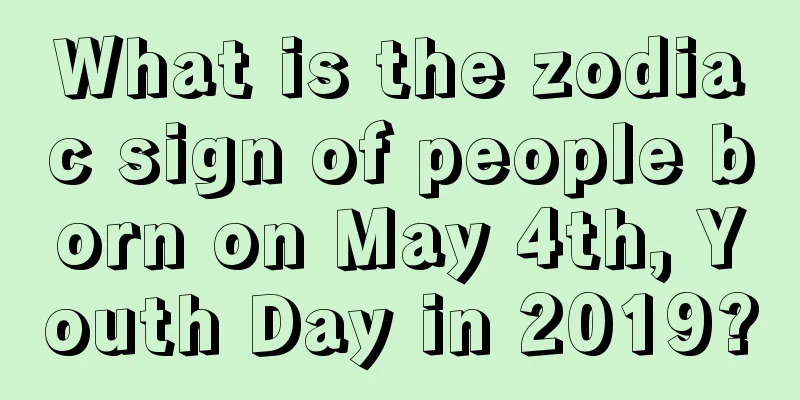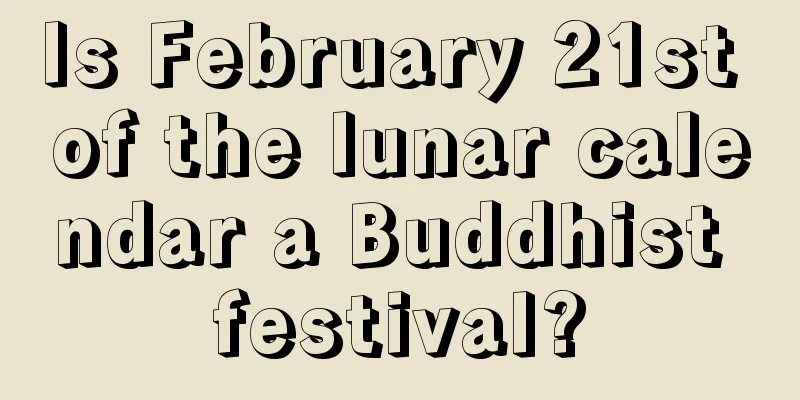Is Yuanxiao the same as Lantern Festival? What are the traditional customs?

Introduction: Do you know what the Lantern Festival is? You may not be familiar with the word Yuanxi, but in fact, the word Yuanxi appears in many ancient poems. Yuanxi and Shangyuan both mean the Lantern Festival, which is another name for the Lantern Festival in ancient times. Let’s take a look at the specific content below! During the first month of the lunar calendar, you will have a good year. The first month is the most important month of spring. Mr. Shui Mo will share with you some knowledge about January.What is the Lantern Festival?Shangyuan and Yuanxi both refer to the Lantern Festival. It is held on the fifteenth day of the first lunar month, which is the traditional Han festival Lantern Festival. The first month of the lunar calendar is the Yuan month, but the ancients called the night "Xiao", and the fifteenth day of the first month is the first full moon night of the year, so the fifteenth day of the first month is called the Lantern Festival. Also known as the Lantern Festival. According to traditional Han customs, on the festive night when the new year begins and the earth comes back to life, the moon is high in the sky and there are thousands of colorful lanterns on the ground. People watch the lanterns, guess riddles, eat Yuanxiao, and reunite with their families in a joyful atmosphere.The Origin of Lantern FestivalThe Lantern Festival is the first full-moon night of the year. “As the new year begins, lights become brighter.” The Lantern Festival is a Han festival formed by the convergence of multiple cultures. In the Southern Song Dynasty, Wu Zimu said in "Dreams of the Southern Song Dynasty": "The Lantern Festival on the 15th day of the first lunar month is the day when the Heavenly Official bestows blessings." The Lantern Festival on the 15th day of the first lunar month is also known as the Lantern Festival or the Shangyuan Festival, and because it is the last climax of the Spring Festival, every household celebrates with great enthusiasm, so it is also called the Little New Year. A traditional festival celebrated on the fifteenth day of the first lunar month. On this day, people eat "medicine rice" or "grain rice" and drink "Cong'er wine" in the morning. Another theory is that the custom of lighting lanterns during the Lantern Festival originated from the Taoist "Three Yuan Theory"; "Sui Shi Miscellaneous Notes" said that this followed the old Taoist customs. Taoism calls the 15th day of the first lunar month the "Shangyuan Festival", the 15th day of the seventh lunar month the "Zhongyuan Festival", and the 15th day of the tenth lunar month the "Xiayuan Festival", collectively known as the "Three Yuans". The three officials in charge of the upper, middle and lower Yuan are the three officials of heaven, earth and man respectively. The official of heaven is happy, so lights must be lit on the Lantern Festival. The Shangyuan Festival is also known as the "Shangyuan Tianguan Festival", which celebrates the birthday of Ziwei Emperor, the heavenly official who bestows blessings during the Shangyuan Festival; the Zhongyuan Festival is also known as the "Zhongyuan Diguan Festival", which celebrates the birthday of Qingxu Emperor, the earthly official who pardons sins during the Zhongyuan Festival; the Xiayuan Festival is also known as the "Xiayuan Benguan Festival", which celebrates the birthday of Dongyin Emperor, the water official who relieves disasters during the Xiayuan Festival.The Origin of Lantern FestivalIn ancient times, the Lantern Festival was also known as the Shangyuan Festival, Yuanxiao Festival, Lantern Festival, etc. Qin Shi Huang Ying Zheng avoided the word "zheng", so it is also called "Duan Yue Shiwu". The day is a full day, also known as the full moon day, which symbolizes reunion and happiness. When Sima Qian of the Han Dynasty suggested that Emperor Wu of Han revise the calendar, the Lantern Festival was listed as an important folk festival of the Han nationality. The Lantern Festival originated in the Han Dynasty and is said to have been established during the reign of Emperor Wen of Han to commemorate the "suppression of the Lü clan." After the death of Emperor Hui of Han, Liu Ying, Empress Lü usurped power and the Lü clan controlled the government. After Empress Lü's death, Zhou Bo, Chen Ping and others eliminated her forces and supported Liu Heng as Emperor Wen of Han. Because the day when the Lü clan was pacified was the fifteenth day of the first lunar month, from then on every fifteenth night of the first lunar month, Emperor Wen of Han would leave the palace in plain clothes to celebrate with the people as a sign of commemoration. And the fifteenth day of the first lunar month is designated as the Lantern Festival. During the reign of Emperor Wu of Han, sacrificial activities to the "Taiyi God" were held on the fifteenth day of the first lunar month. Sima Qian listed the Lantern Festival as a major festival in the "Taichu Calendar".Customs of Lantern Festival1. Eating "Yuanxiao" on the Lantern Festival Eating Yuanxiao on the fifteenth day of the first lunar month is a long-standing custom in China. Yuanxiao is also known as "tangyuan". Its preparation, ingredients and flavors vary, but the meaning of eating Yuanxiao is the same. It represents reunion, harmony and happiness, and a more prosperous life. There is a saying that harmony brings wealth. Family harmony and family reunion are such important factors for a complete family. Therefore, it is important to eat "Yuanxiao" with your family during the Lantern Festival.2. "Sending Lanterns" on the Lantern Festival "Sending Lanterns" is abbreviated as "sending lanterns", and its actual meaning is sending lanterns to children. That is, before the Lantern Festival, the daughter’s parents would send lanterns to her family, or relatives and friends would send lanterns to the family of a newly married couple who are infertile, in the hope of having a child, because “lantern” and “ding” are homophones. It means that the daughter will be blessed with good fortune after marriage and give birth to a son soon. If the daughter is pregnant, in addition to the large palace lantern, one or two pairs of small lanterns should also be given to wish her a safe pregnancy. 3. Dragon Lantern Festival The dragon is the totem of China. The Chinese nation worships the dragon and regards it as a symbol of good luck. On the fifteenth day of the first lunar month, the festive atmosphere of dragon dancing, singing and dancing is spread to many places. 4. Lion Dance on the Lantern Festival Lion dance, also known as "lion dance", "lion lantern" and "lion dance", is mostly performed during festivals and festive events. In the eyes of the Chinese, the lion is a auspicious animal, symbolizing good luck and fortune. Therefore, the lion dance activity embodies the people's good wishes to eliminate disasters and seek good fortune. 5. Guessing riddles on Lantern Festival During the Lantern Festival, riddles are posted in various places, hoping that this year will be joyous and peaceful. Because riddles can enlighten the mind and are interesting, they are welcomed by all walks of life during the process of circulation. During the Tang and Song dynasties, various acrobatic performances began to appear in lantern fairs. In addition to lantern riddles and various kinds of singing and dancing, the lantern fairs in the Ming and Qing dynasties also added opera performances. 6. Stilt-walking on the Lantern Festival Stilt-walking is usually organized by the masses spontaneously. The street parade begins on the 11th and 12th day of the first lunar month, implying that people should register for one of the many folk flower festivals this year. The street festival officially starts on the 15th day of the first lunar month and ends on the 18th. Summary: After reading the introduction in the above article, we know that the Lantern Festival is also called "Yuan Xi" and "Shang Yuan". We also know the traditional folk customs and activities of the Lantern Festival. I hope everyone can learn more about the culture of traditional festivals and feel the wonderfulness of traditional festivals! After reading this article, there are more exciting contents in the special topic of the first month of the lunar calendar. Let’s take a look! |
<<: What customs do ethnic minorities have for celebrating the Lantern Festival?
>>: What is the meaning and representation of the Lantern Festival?
Recommend
Is it good or bad for people born in the year of the monkey to have their birth on the Double Ninth Festival?
Is it good or bad for people born in the year of t...
What day of the lunar calendar is the 2019 Spring Festival? Customs of the Spring Festival in various places
What day of the lunar calendar is the 2019 Spring ...
Is the Rain Water solar term in 2020 an auspicious day for burial? Check the auspicious time for Rain Water on February 19!
Introduction: It is also necessary to choose an au...
What date is the sixth day of the second lunar month in 2020? Is it an auspicious day?
The lunar calendar and the solar calendar are both...
In which direction will the God of Happiness be on the Grain Rain Day in 2022?
Grain Rain is one of the solar terms that reflects...
Is March 26th of the lunar calendar in 2022 a lucky day or an unlucky day?
No matter what you do, you need to choose a good t...
Is it suitable to get married the day after the Minor Snow in 2019? When is the Minor Snow in 2019?
Introduction: Every day has its good and bad luck,...
Do girls born on the fifth day of the ninth lunar month in 2019 have bad luck?
Destiny is determined at birth. People born on dif...
Fate analysis of a boy born on the first day of the Lunar New Year. Is a boy born on the first day of the Lunar New Year destined to be an emperor?
The first day of the Lunar New Year is the first d...
Can I get a haircut on the eighth day of the third lunar month in 2022? Is this a good day?
The third month of the lunar calendar is the month...
Can I visit the graves and worship my ancestors on March 18th of the lunar calendar in 2022? How are you doing?
Speaking of tomb sweeping and ancestor worship, I ...
Is it a good idea to get married on the Spring Equinox in 2021? Introduction to the etiquette and customs of the first year of marriage
You also need to choose a good time to get married...
Where is the God of Wealth on September 26, 2017?
September is in late autumn, and every day in Sep...
What is the date and day of the 18th day of the seventh lunar month in 2017?
What day is July 18th in the lunar calendar 2017?...
What festival is there on the 16th day of the first lunar month? How are you doing?
On the 16th day of the first lunar month, the Han ...









